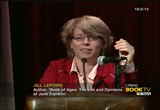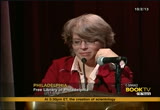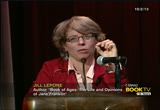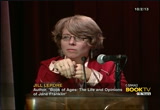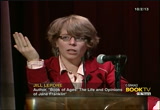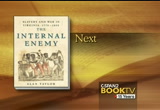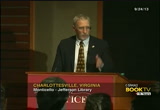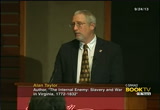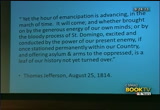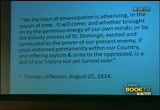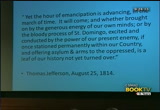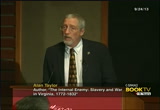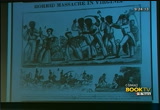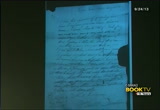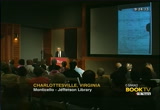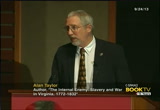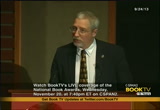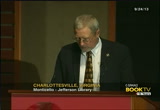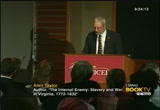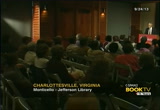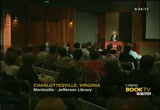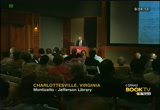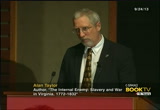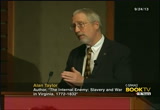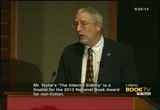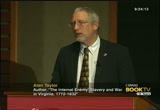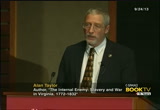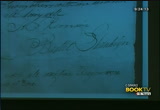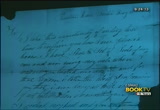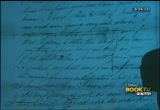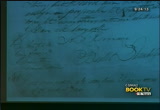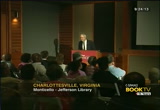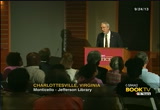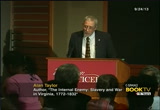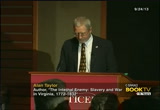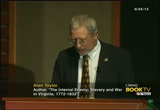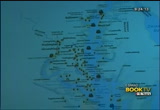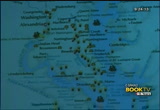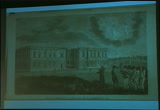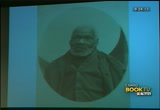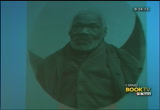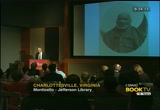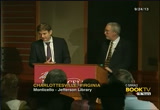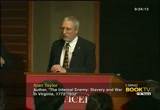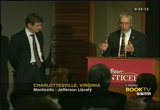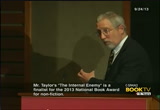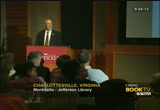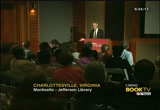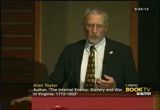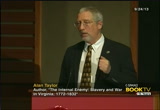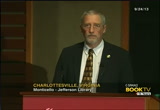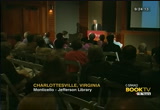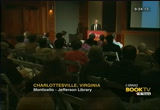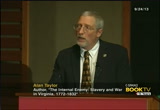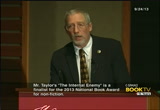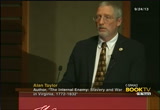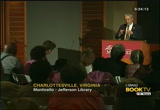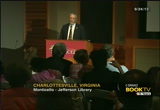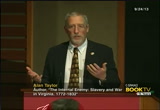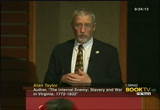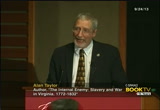tv The Internal Enemy CSPAN November 17, 2013 3:00pm-4:01pm EST
3:00 pm
impossible. listen to what no one could write that book. she belike so what, right the book. but get this done. side made progress on it over the years. i had abandoned it like 10 times. i'm not really a fat person in embracing my own children to give out all this death, it scared me. i met my father died and my mother was ill and i thought, this i must do. ..
3:01 pm
>> he wasn't the finding stories, i very quickly realized that what the sources i had gotten to the end of them. finding books though, i did find some books that were signed. and i did fine that i met with a curator to look at a ring as having once belonged to benjamin franklin and i am thinking that franklin is not wearing a ring. and not in the portrait. and it was a morning rain, like someone with diet and would give out a memento and it was being
3:02 pm
worn by james nephew. and he had actually deeded that specific ring to her granddaughter in her room will. and like a lot of things that once belonged to him, it only survived because it -- in this case it had a fictitious connection to benjamin franklin. so i made them change the catalog entry. but when they weren't looking at the good habits piece and put it on. you know, i'm never going to be let in there again. but i thought, no one has asked look at this room in two centuries. so i'm going to put it on. [laughter] and i could barely get it off my pinky.
3:03 pm
and i was just so sad that it didn't fit me. i find your life so sad and constrained and it did happen to me to seem very magical and moving. and to me the real obstacle was it is asymmetry and here is ben franklin and he is wonderful and you know, we know nothing and also it's not wonderful. and we live in a world of inequality and grotesque inequality and we cannot bear
3:04 pm
it. but i will tell you that the turning point for me encipher my parents that we as a community and people, we need to understand that's a whole lot better. and we have to learn something about it. so thank you all very much. >> booktv will be live on c-span2 and booktv.org on the national book awards on new york city on november 20. for more information on the national book awards and a complete list of nominees, visit national book.org. >> booktv will be live on c-span2 on the 64th annual book awards on november 20. in anticipation of our words coverage, we are featuring the
3:05 pm
five finalists in the nonfiction category. up next, alan taylor recounts the impact of slaves in virginia in the war of 1812 from his national book award nominated title, 7072 through 1832 and this program is one hour. [applause] >> thank you, andrea. thank you for that very nice introduction. i'm so delighted to have the opportunity to present this book here. i would say about half of the writing and a big chunk of the research i did while i had a fellowship here at the international center and so i want to thank andrew for that and my good friend and my amigo for many acts of friendship and for setting such a high bar for
3:06 pm
the memorial foundation chair in the history of the university of virginia. i want to thank mary scott fleming for keeping the trains running on time for this particular presentation and to christopher oliver assistance in arranging this and it is so profitably spent here. i want to thank my sister and brother-in-law for traveling here from connecticut for this. and i want to thank my family for coming. tina came here from atlanta. they and their family are descendents of ezekiel, who is one of the readers of the largest single escape of slaves from a virginia plantation during the war of 1812 and since
3:07 pm
it is monticello, we begin with thomas jefferson and his words and this is a quote that comes from a letter that he wrote in response to edward cole, his former secretary purdy wrote this letter of 1814, which is a low point for the united states and its war against the british empire. what the war is, the war of 1812 which lasted into 1815. and those of you who know about this occupation and the partial burning of washington was right after the british had occupied washington and all the buildings were burned. and jefferson was writing that letter so he didn't know yet about that. but he knew that the war was going very badly for the united states.
3:08 pm
and this includes a more leadership role in a struggle to achieve emancipation and this includes his day had passed and he thought that the moment had not yet arrived in virginia and then there's a very interesting passage here. the emancipation and trans- emancipation is inevitable. but he lays out to possibility as to how it could be achieved. and one is that virginians can achieve the generous energy of our own minds that they would set aside self-interest in order to emancipate the slaves. and then he considers a more imminent possibility because while jefferson had said the moment had not arrived for
3:09 pm
virginians to exercise this generous energy, he thought there was another process and one that he saw unfolding as he wrote about it, which is that the british have come in with considerable arms strength into the chesapeake bay and then he said they raided the shores of the chesapeake and they were mounting increasingly aggressive invasions into the interior which culminated in the capture washington dc. in the process of doing now, they were helping enslaved peoples to liberate themselves. and jefferson is suggesting that if the war goes on in the british bring larger forces and establish a permanent presence on land and in virginia or maryland, that it is going to start a cycle of liberating
3:10 pm
thousands of enslaved african-americans. in the language is interesting because thomas jefferson was never known to say anything good about the british. but in this passage he is saying that they are often a silent arms to the oppressed. and the suggestion is that the virginians if they don't breed of slaves, they are the assistance of the oppressed. >> let me just go back and point out one phrase and of saint domingo and saint domingo was a french colony in the west indies which has since become the republic of haiti.
3:11 pm
and during the 1790s, there was a very bloody revolution in which enslaved peoples established their freedom. and in the next decade to establish their own republic. this is something that deeply troubled virginians. because they feared that their own slaves would engage in revolution and in effect, these tyrants would kill men and women in their beds. and here is an image that expresses that fear by white virginians and this is an image from 1832 and it indicates the rebellion. what is striking is that that is a one off but there is nothing else like it.
3:12 pm
and this is a long-standing nightmare and that enslaved people will rise up in rebellion and engaged in indiscriminate massacre. in the actual evidence is that while people were often plotting to escape, they were not plotting mass murder. but this idea of the massacre is something that is resonant throughout the rhetoric of virginians during this occurrence. >> thank you. >> now, i would like to talk about chesapeake bay and they
3:13 pm
did not initially come to liberate the slaves and indeed they have orders at the start of 1813 when this expedition begins and the orders are not to liberate more than a handful of men and women that could be useful as guides. but the british don't want to repeat what they have done to help to liberate and men and women and children and were saddled with the expenses of dealing with a great number of refugees. in this new war of 1812, the british wanted it to be over with as quickly as possible and they wanted to be left with a few responsibility as possible and hence the orders to the naval commanders only free if you men that could be helpful. but what happens instead is that
3:14 pm
hundreds, probably about 600 during the year 1815, takes it upon themselves are still commuters and the prime british purpose for being in chesapeake bay is not to liberate the slaves but to inflict as much damage on the american economy as possible and to punish virginia which is quite perceived to be correctly the political heart of the united states and the home of president madison and secretary of state munro. considered to be a hotbed of support for the war. and they are perfectly willing to include this collateral damage and then they discover as these 600 enslaved people this seacoast that they need the help of these slaves.
3:15 pm
but they cannot achieve their purpose without it. they do not know the lay of the land and they are very nervous in 1813 about going onshore for the fear of the ambush and the only ones they get experts on the landscape that they become aggressive about going deep into the interior and they have to go deep into the interior until they are receiving hundreds of refugees because they, along with the sailors and the marines have to be fed. and much of this comes from reading farms and plantations and the people who know where the cattle can be found in where they have been hidden in where they can be found, they are the runaway slaves. they have become infantrymen were colonial marines, to be more accurate. guides and pilots and by the
3:16 pm
second year of the british operation, they are its essential and this is further inland than before. this is not an incidental byproduct of a british operation. this liberation and this was at the heart of the transformation of that operation into something far more effective and much more threatening to the united states to what i want to do now is talk about one particular escape which i find especially revealing. it occurred on the night in october of 1814 on the virginia shore of the potomac when
3:17 pm
several young enslaved black men stole a canoe and paddled across the river to the maryland shore to a place called the fairy and what they are after is doing this in the middle of the night and they have stormed a canoe without waking anyone up and they have somehow managed to steal this without waking anyone up and loading of 17 people and for a -- down the river in search of the british warship as their portal to freedom. their slaves were gone and in the words of one quote, had taken many articles out of their dwellinghouse in the course of the night and all their articles and effects out of their house. and out of the house as well.
3:18 pm
they rode a swift vote and pursued down the river but they were too late because the 17 escaped slaves had become free by reaching a ship. i would like to spend some time on this particular escape because it's revealing as i find in many escapes. and first, then showed very careful planning and organization and this is not a spur of the moment emotional decision and they have accomplished all of this and they managed to empty and they have their own possessions as well and so as you can see in
3:19 pm
this shows a two-stage pattern, which i find a first stage in which an initial few young men tried to obtain the names to their plantations in order to obtain women and children out. and so we have these three young men who have the ferryboat in a and they come back and they load up 14 more people. and the most common patterns as for the initial leaders, i will call them the pioneers to steal a canoe and persuade the british to make a wave on their particular neighborhood with her family and friends and this was
3:20 pm
the pattern at the plantation in april of 1814. in which ezekiel owning was one of the pioneers who escaped to the british on april 18 and then returned guiding them on april 21. >> 27 and managed to get out another 66 people to freedom. and you have added up to 69 and it becomes one of the women that i've become so pregnant that she gave birth on a warship. she was not determined that her child would be born free. in another pattern that we find in this is that they don't come away from one property and they
3:21 pm
sometimes have the notion because of the way that documents survive because of the wealthiest people and it is bounded by the property lines of large plantations. sometimes that's the case but in the chesapeake, the great majority of enslaved people in 1812 live on farms rather than plantations including slave holdings of five or six waves on a farm than it is to find 70 slaves on the plantation. there were plantations and large numbers occasionally, but the most common pattern is slavery has become dispersed among many masters and so in this case, not all are coming.
3:22 pm
>> this includes the property and the types of neighborhoods that african-americans formed under slavery and they formed these neighborhoods largely at night when they are partially liberated and they can travel through the neighborhood and it is their expertise gathered by traveling at night and learning the byways of how to avoid the slave patrols in order to be with a husband or a wife or their children or friends and close aunts and cousins and it's a very -- it's actually uncommon for a husband and wife, for them to live in the same area, they have been split up where they've always lived before and so they
3:23 pm
have to learn the landscape particularly the nocturnal landscape in a more intimate way than their masters ever had to end it is that nocturnal knowledge and it will serve the british so well which always almost began at night. >> it is especially have the surviving appraisals for them. and nearly $8000. this includes two carpenters and two crooks. and it is true that over this as part of the field hands, but a
3:24 pm
growing number have been marches and all scale where they served as house servants and people who were slaves or artisans had a much higher value than virginia and so this is the most high-value that they felt they could trust the most because they have a skill and are probably treated a little bit better and it is exactly those who tend to rebel when they have seen a little bit of opportunity and how much more opportunity has been denied to them. and finally, we find in these escapes that the age patterns to use towards younger people and
3:25 pm
the dangerous and so it is not for the faint of heart. and it tends to be young men and women in their 20s and 30s and this includes males and females in it and this include two young women and three children and one of the features is that because they are right there in chesapeake bay, they were willing to get to them with entire family groups that is higher than peacetime estates offered so they find it's almost overwhelmingly something on the order of 85 to 90% of young men to go in these wartime misdeeds. and that is because there are
3:26 pm
more family groups and i want to turn to this letter which has written 5.5 years after the escape by the apparent leader of the escape and 1814 and you can see the signature there and it was someone who was as proud as it has someone ever was. and so five and a half years before he wrote this letter in may of 1820 in 1814, he was considered the highest value slave to escape from abraham. he was appraised at $800 and that is because he was a blacksmith and that includes high physical amount of labor and a great deal of intelligence and the ability to keep accounts
3:27 pm
and a natural person to be a leader and from a tone of this letter is clear that he was the leader. and he was thriving from the very top because letters from the early 19th century usually put the place on the date and where is nova scotia? and it is a black township would formally enslaved people after the war of 1812 and comprise a majority. it is near halifax and was thriving and he wanted the former owner to know it. and so he wrote this letter and
3:28 pm
this is a struggle to figure out what is going on, probably to know what's going on in the front row, so i will read it and mrs. my glasses because i read letters like this for a living. and so i take this opportunity of writing these lines to inform you how i am situated here. and i am doing very well and you treated me very ill. for that reason, i take the liberty of informing you that i am doing as well as you if not better. [laughter] >> when i was with you, i worked very hard and you never gave me money nor any satisfaction, that since i have been here i have been able to make gold and silver as well as view and he
3:29 pm
was very strong and i showed him that subtlety was far preferable to strength and who thank god they are all doing well. so i remain part of it. ps my love to all my friends, i hope that they are doing well. [laughter] >> this is extraordinary. i have read thousands of letters as a historian over the years and i think this is the most important letter that i have found. and so what do i make of it? and i ask you what you make of it and i would welcome your thoughts. but this is what i would make of it. as a free man, he was especially
3:30 pm
proud that he could make his own money. the enslaved people of virginia overwhelmingly were the third and fourth and fifth generation people in america and they were not fresh from africa. they understood the society around them and they understood that they value people in terms of the money that they could make in the possessions they could display and they felt deeply frustrated that other people got to make money and display possessions because of their labor. and what they want is going on is that now that he is a free man, he makes his own money and he's a good as a man and he is the better man, so what do i think is implicit there. and he is suggesting that he has made his money more honestly
3:31 pm
rather than the labor of other people. i am only guessing, i haven't been able to find him in the historical record and my guess is that he was the overseer and all we can really tell is two things, a strong and powerful man that must've been very powerful if he was more powerful than shanklin. and he did something to try to obstruct this the most wonderful phrases that he said subtlety is superior to strength. and this is a theme that many historians work with the resistance to slavery that has emphasized, the ways in which enslaved people have to be
3:32 pm
clever to hide their resistance to make it more effective. here we have a form of slaves winning explicitly and that's where it has happened. they had fooled them in order to pull off the escape and achieve freedom for 17 people. in our final question is how is it that this letter survives. first off, i am not surprised to find a letter written by a former slave, this is a period before the 1832 law outlawing the teaching of literacy to enslaved people during the previous generation and literacy among slaves is more common than what i think we have recognized and i'm not saying that most of them were illiterate, but i am saying that it is more common to find them in that period than
3:33 pm
either during the colonial era were subsequently after 1832. almost all of the enslaved people have become christians under baptist or methodist and many of them want to be able to read the bible and the preachers want them to be able to read the bible and often for those, the masters want them to be able to keep accounts and they are most likely to be a part of this. whether it was after they became free or afterwards, but i do think that the hand was a pretty good one comparing to a lot of people in virginia between white and black from this time and how does the letter survives? and he saved it and he submitted
3:34 pm
it to the federal government in order to get compensated including the many that he had armed, a claims condition who could prove that they they had escaped and gone to the british. this letter is worth $280 times 11 to abraham heard, because he's going to get $280 for every former slave that he can document that went to the british and this is his best piece of evidence, so i found this in the national archives at college park and the record of the claims commission. and it's a phenomenal set of records to seek money but for preserves this trust to lead
3:35 pm
today. >> and just a couple of images to wrap up this extraordinary story of the war of 1812, here is a map that represents the british military operations in chesapeake bay in 1814 and you can see this symbol of a burning house that represents this and you can see that the rates are clustered in southern maryland and the northern neck of virginia and that is what the british have targeted and why did they target that region? well, first reason is there's a majority and they can get the assistance of a lot of people if they go there. and it's very difficult for them to resist these attacks and offer the gateway to washington
3:36 pm
dc. another long-term goal to strike out washington first they have to neutralize the militia resistance in southern maryland and they want to keep americans guessing they're going up the river in maryland. ultimately they will choose this until they got up and not until they got into the outskirts of washington dc. in this includes resistance to southern maryland depended on the assistance that they were receiving several hundred of whom have enlisted to become colonial marines who operated as the infantry who is the best
3:37 pm
troops of the british have and why are they the bastards? because they are the most highly motivated. and they have the least like to desert. and these former slaves do not deserve to go back to life in the united states. so skip that. and this was produced after the war of 1812 and they conveyed the message. and it is the u.s. capitol building and it shows that fire damage from the british colonial marines assisted in this operation in what is especially interesting is the representation of lady liberty.
3:38 pm
and this is a common site of enslaved people and they have brought this on a guilty nation that needed to restore the favor to the united states. and so the final image, this is the only known photograph to survive one of the escaped slaves from the united states during the war of 1812. this is a much wider photograph from 1892 when he was 92 years old and so he was 15 years old when he escaped and in very early 1815 from calvert county,
3:39 pm
maryland. his name is gabriel hunt and he would prosper as a farmer. and this reveals that some people prospered from their escape economically. most of those endured poverty. and it was not enthusiastic about taking refugees and provide it to them by the royal navy encourage them to go back to slavery in the united states and suggesting that they would be warmer and happier as slaves than poor people in nova scotia. and how many do you suppose accepted this invitation? that would be zero.
3:40 pm
i may have decided that they were free, they might be poor, but they were free and they can make some of their own money and keep it. but the most important thing for them is that they could live together as families and the worst thing about their experience is that each individual was treated as a piece of property whenever the master so decided for whatever a court decided where they could be ruptured and divided by inheritance or by an auction at the death of the master in 1826 after jefferson's death. and so the most important deficit that they found they could live together with greater security than they ever could while they were slaves in the chesapeake. so thank you.
3:41 pm
[applause] >> thank you very much. i told you that he had a lot of neat material and he is a real gem. there are a lot of parallels with the revolution and networks that exist that information can travel hundreds of miles through different networks. the assistance given by slaves to the british, the one state that the british really took during the revolution was in search of all that who led that and was part of this.
3:42 pm
and also going to nova scotia. but the parallel is equally treated and it is from there that they led the expedition to sierra leone. and i'm not sure if you want to comment on the parallels which is on a larger scale which represents the biggest emancipation in america before the civil war. and when we do take questions from the audience, please wait until the microphone gets to you because we are on c-span. >> we have worked on the question in this includes 6000
3:43 pm
from from virginia and half of them died from disease before they could leave virginia. and they were relocated to nova scotia. so it is part of maryland and virginia and i estimated about 2800 ended up in the air, and the key differences is a much healthier experience in terms of they are not subject to the same smallpox epidemic that killed so many of those in the revolution. virtually all of them were relocated to sierra leone. given the small size and trim size of this to having no black
3:44 pm
people and known there is a new search that comes in 1812 and there is a new group that makes it quite clear that they are not going anywhere and they suggested they go back to virginia and the authorities of nova scotia, they didn't want to send him back to slavery. the home government in britain did suggest that they go to trinidad and the large number, those who served with their families served and had gone to trinidad and they had prospered there to a greater degree than those in nova scotia and those, only about 95 accepted the invitation to join the group already in trinidad. so why are they willing to go?
3:45 pm
well, it is because they don't want to get on ships again and they don't want to get on since the american coast. because they are nervous than they trust the shipmaster's not too make a fast buck by selling them or by might they risk a shipwreck and i knew they would not be treated this way if that happened. so they are quite clear that we are not going to trinidad in the win95 would take that risk. >> it's a really bad talk and my feelings would be hurt. [laughter] >> we hear the microphones moving around. that's great. >> i'm curious how this change
3:46 pm
the way that many look at slavery. the something tincher as well? >> up the great question. and i think something does change. what changes is that up until the war of 1812, and it is part of their federal government. he has been succeeded by madison and he had been president of the united states and virginia is the biggest and most populous state and the most influential state in the union. they expect that the federal government will do what virginians want done. so what virginians want done most of all during the war of 1812? they want the federal government to defend them. and that's not to defend them against british raids, but those escaping to the british and that the united states for a variety of reasons is overwhelmed by
3:47 pm
this war. they are not able to raise enough troops or supply the troops adequately, they decided to make this priority is almost all u.s. troops sent to invade canada leaves very few u.s. regular troops to defend virginia, almost all of them are leaving all of these other people exposed to the british attack and oppose at a great expense and a great hardship on the militia and the common farmers and the artisans and people that have to put down their tools and plows and have to go and deal with these raids. it frustrates the leaders of virginia and to the standing of the federal government goes way down. and also this is a time in which
3:48 pm
new englanders are becoming more vocal than ever before in denouncing slavery in order to attack virginia's leadership of the nation and so virginia is getting really defensive about these attacks on iraqi because of their slavery. so they come out of the war thinking that federal governments are not worth very much to us and what happens if it gets in the hands of these new englanders who engage in this rhetoric which we find to be insulting and reckless. and then in 1819 in congress and the republican congressman they introduce a resolution this as a mistake statement in common with the constitution which provides for the gradual emancipation. and this is a state that is most upset about the missouri compromise, a state that is most
3:49 pm
adamant and that is virginia and so my reading of this is that the war of 1812 is a very important step along the way of virginians deciding that the whole union is something that they do not entirely trust and that they have to have greater solidarity with their southern states that had not always been evident before the war of 1812. so not arguing that it is a watershed on the way to the civil war, but i'm saying that it's an important step in a very long process of many steps. >> thank you for your presentation. i'm curious to know what can be
3:50 pm
said about the repercussions upon those who were left behind and what disincentives, so to speak, might have been imposed upon him? >> i wish that i had evidence on that, but i do not. i do have some evidence for what happens with those who are caught trying to escape in what seems to have happened is they would be whipped within an inch of their lives and then cast into jail for a wild while the owners would arrange for this very far away from the coast and usually to the deep south. and as far as i can tell, all of the escapes occurred in tidewater and i don't know of a single individual who escaped to the british during the war of 1812.
3:51 pm
and so the decision is made when they suspect this was a catch anyone trying than they have to send them far away and turn them into this situation and make sure that their example is punished that way and that is about as severe as a punishment as you can inflict on someone, probably never to see that family again. and the british would tell them that they probably shouldn't ever try to go back because the americans would hang them. but i haven't found any evidence for any hangings and i think it would be unlikely because of you hang someone, you lose the value of the property and virginians had a policy of compensating people for states that were executed and i cannot find any compensation for executed runaway slaves during the war of
3:52 pm
1812. i have some questions here and also here in the front. two thank you. >> if it's not the case that the virginia legislator of 1830 failed to pass a law abolishing slavery in virginia by only one vote. >> i am not so clear that it was by only one vote. but i think that what you are thinking about is that in the late 1830s, there is a debate over whether virginia should consider a plan for the gradual emancipation of slaves linked to the forced deportation of the free blacks and at that time was virginia was part of virginia and that was a part of a state that was most willing to support such a plan.
3:53 pm
the plan was pushed very hard by thomas jefferson's grandson. thomas jefferson randolph. and it is a plan that he had tried to advance and part of the previous decade and it goes back to thomas jefferson's own plan in the state of virginia. in this plan had been out there for a while and it is a plan that is completely unfeasible and it is the only thing that virginians could possibly consider as a mode of emancipation and it turns out that it is more than just a single vote, i can't remember what it is, they decide to cut off further debate and will just not consider the question. this last time but the virginia
3:54 pm
legislature considered any proposal for any form of emancipation and this includes several generations of its slaves, which it could not have followed her because no one was going to love level the taxes necessary and enslaved people overwhelmingly did not want to go to liberia. because it was a pretty grim situation, particularly for disease, and this became pretty well-known and so in this includes colonization and it's a nonstarter for many reasons. and that is what this episode was about. >> we also have a question here.
3:55 pm
>> how many successful escapes to trinidad were you able to find? >> many have escaped with the british, the men would become organized as colonial marines and women and children would come along and be in the refugee camp and later some of them would be part of this with women and children and after the war the british would reallocate them to trinidad. so there's kind of a division. and those will go to trinidad, overwhelmingly those associated with it. and they are settled in particular communities known as company towns and given their
3:56 pm
own and this includes the noncommissioned officers of the colonial marines are then became the local magistrate of these communities and the local leaders. the missing includes justice. it's one big escape to trinidad, which is organized with the help of the british. are there any other questions or? >> thank you for that insightful presentation. a question for you. >> thank you for that insightful presentation. a question for you. did you by chance run into any letters from trinidad for the trinidadian refugees about their experience and i would suspect
3:57 pm
it would be difficult from the other direction. i'm just curious to know. >> i did not find any of this from trinidad. i found letters from scotland and from london and the account of a former slave and so while i say some of them became global travelers. and there is this kind of conversation that the british allow them to talk to former slaves the former slaves because they wanted to make a point. in any of them that wanted to go back with a master spirit. and this one slaves said that i was born to travel the world. and he wasn't in a addition to
3:58 pm
do much traveling as a slave in virginia. but by becoming free, he could have and so he is the who ends up in this with a better account and i don't have letters directly from those in india and spain. one fellow from maryland became a dentist and he began to work for him in london. so there are a are a an array of extraordinary stories and from trinidad what i have in this includes the next conditions there and one of them worked as an agent for joseph kennedy for which it was named, one of the founders and he was also than 70 people free themselves in april
3:59 pm
of 1814. and he wanted to know what happened, so he sent an agent to trinidad and it included the names of some of his former slaves. [inaudible conversations] >> i'm not sure about the dates, but the british, they did an emancipation and also how did they accomplish that? >> certainly the masters and the west indies. and slavery had become
4:00 pm
technically illegal in other countries as well. and as you can imagine, there were a few enslaved people there at that time. and there was at least a thousand, more slaves in the west indies than virginia in 1812 and so it's not like berries have hands that are completely clean. this includes their own purposes helping enslaved people become free. they are at least true to their word. but the british took these runaway slaves and sold them to the west indies. ..
139 Views
IN COLLECTIONS
CSPAN2 Television Archive
Television Archive  Television Archive News Search Service
Television Archive News Search Service 
Uploaded by TV Archive on

 Live Music Archive
Live Music Archive Librivox Free Audio
Librivox Free Audio Metropolitan Museum
Metropolitan Museum Cleveland Museum of Art
Cleveland Museum of Art Internet Arcade
Internet Arcade Console Living Room
Console Living Room Books to Borrow
Books to Borrow Open Library
Open Library TV News
TV News Understanding 9/11
Understanding 9/11